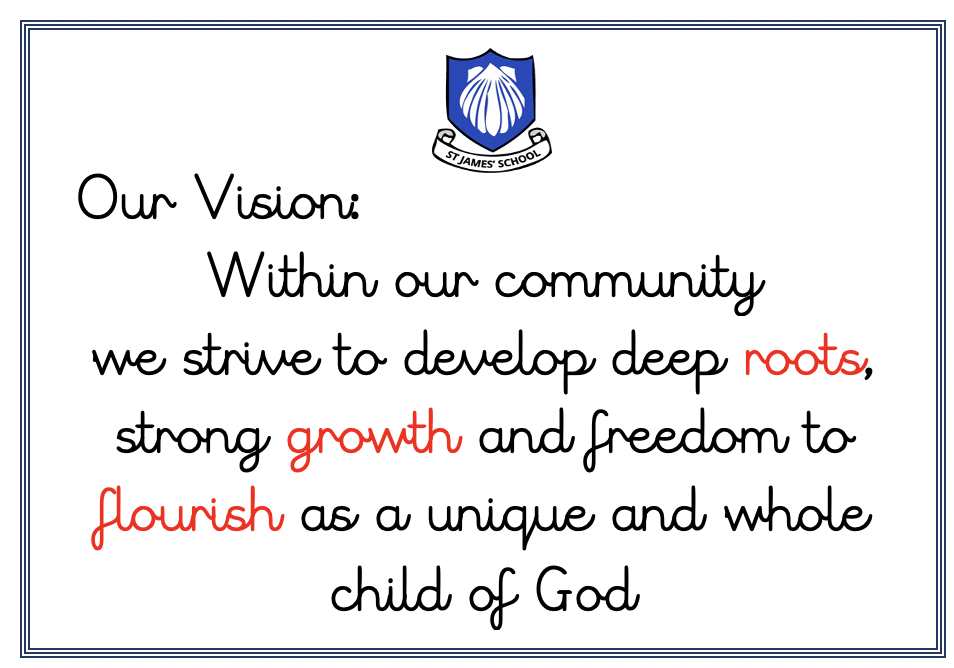Maths

At St James' CE Primary School, we recognise that Mathematics is essential to everyday life, critical to science, technology and engineering, and necessary for financial literacy and most forms of employment. We want our children to become self-confident mathematicians. We aim to provide a high-quality mathematics education with a mastery approach so that all children:
- become fluent in the fundamentals of mathematics;
- reason mathematically;
- can solve problems by applying their mathematics.
(National Curriculum 2014)
Our maths curriculum provides broad and balanced opportunities which aim to drive a life-long love of learning as well as encouraging a positive learning attitude.
At our school, our intent for Mathematics is to teach a rich, balanced and progressive curriculum using maths to reason, problem solve and develop fluent conceptual understanding in each area. Teachers are supported and aided in their roles - ensuring confidence in the skills and facts they are required to teach. Lessons are child focused and allow the children to better make sense of the world around them relating the pattern between Mathematics and everyday life. We want all children to enjoy Mathematics with the ability to reason mathematically. We are committed to developing children’s curiosity about the subject, as well as an appreciation of the magnificence and power that Mathematics has to offer as a subject.
This particular policy outlines the teaching organisation and management of Mathematics taught and learnt at St. James CE Primary School. The policy is based on the 2014 National Curriculum expectations and aims for Mathematics and the Early Years ‘Development Matters’ EYFS document.
Intent in accordance with the 2014 National Curriculum:
The 2014 National Curriculum for Maths aims to ensure that all children:
- Become fluent in the fundamentals of Mathematics
- Are able to reason mathematically
- Can solve problems by applying their Mathematics
As a school, these skills are embedded within Maths lessons and developed consistently over time. As stated in our maths vision, we are committed to ensuring that children are able to recognise the importance of Maths in the wider world and that they are also able to use their mathematical skills and knowledge confidently in their lives in a range of different contexts.

We implement our approach through high quality teaching - delivering appropriately challenging work for all individuals. To support us we have a range of mathematical resources (manipulatives) in classrooms including Numicon, Base10 and counters. We use the White Rose Scheme of learning as it provides a platform for staff to build from in order to deliver high-quality teaching to pupils. We continuously strive to better ourselves and frequently share ideas and things that have been particularly effective. Our mastery approach to the curriculum is designed to develop children's knowledge and understanding of mathematical concepts from Early Years through to the end of Year 6.
Maths is delivered through high quality teaching and learning and also through a concrete, pictorial and abstract approach to mathematics, where manipulatives play an important role.
At St. James' CE Primary School, we use White Rose to ensure full coverage of the National Curriculum. Teachers are expected to use White Rose to its fullest and provide children with challenges to ensure a mastery approac
CPD is available for staff during INSET at the beginning of the year and on an individual basis throughout the year.

St. James CE Primary School has a nurturing ethos and our approaches support the children in developing their collaborative and independent skills, as well as empathy and the need to recognise the achievement of others. Throughout their learning journey, our children will become fluent in the fundamentals of Mathematics – encouraging them to be life-long learner. The White Rose scheme certainly addresses these preconceptions by ensuring that all children experience challenge and success in Mathematics. Through varied and frequent practice, with increasingly complex problems over time, pupils will have the conceptual understanding and the ability to recall and apply knowledge rapidly and accurately.
Regular and ongoing assessment informs teaching, as well as intervention, to support and enable the success of every child. These factors ensure that we are able to maintain high standards, with progress and achievement at the end of KS2 is above the national average. Children’s skills and knowledge should be built upon year-on-year allowing them to master maths at their own level and continue to progress well in all areas of the subject.
We review learning and the impact of our teaching by evaluating pupil voice and tracking attainment and progress. We celebrate and share highly effective practice proven to have an impact upon the children’s learning. We continuously strive to improve the impact of the maths curriculum by highlighting areas of development so that the learning remains memorable and has an impact on the experience, skills and knowledge developed.

